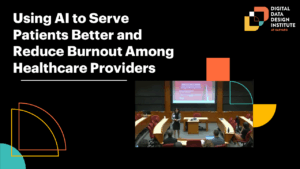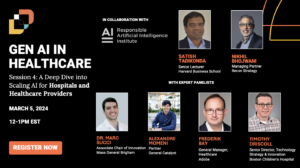Data as Currency: AI. Development of a Data Science Institute in an Institution NOT connected to an academic university
#AI is #FutureofHealthcare. For #Healthcare Institutions without a connected #university or #technology campus, how can robust AI teams be built to create and support a #DataScienceInstitute for #imaging #data so that #algorithms are developed and #PatientOutcome studies are performed ?
AI is a paradigm shifting force particularly for medical imaging. Radiology is one of the most data rich specialties. Information in images that is imperceptible to the eye are a particularly rich source of data for research outcomes.
New teams are needed. Many of the key people/stakeholders are not part of a traditional radiology team. They include in addition to radiologists, computer scientists, pathologists, oncologists, biologists, biostatisticians and post docs and students. Many of these people are only found at a university – particularly a tech campus.
**For institutions without a connected university/technology, how can robust AI teams be built to create and support a Data Science Institute?**
There are many other challenges using the data to build models and moving toward a more automated algorithmic approach.
Challenges include ethical issues such as patient confidentiality and legal issues. Who owns the data? How do you develop and maintain trust with patients and referrers? How does academics and industry work together?




Hi Liz,
I find myself in a very similar circumstance as head of a very large ob/gyn community based department. I became very interested in the concept of AI in predicting poor maternal outcomes based on both the desire to improve outcomes but also the global lack of energy in this issue in my space. To resolve this I have partnered with our EMR vendor (Cerner) who has a division called Cerner Intelligence. They have data scientists and are interested in developing and equally important, implementing these models into their EMR. To date we have developed and are now validating models of maternal transfusion >4 units prbc, unintended ICU admission, and readmission. The great part of this arrangement is because our data is remotely hosted they do all the heavy lifting and I can just direct the science. This work has actually garnered the interest of 3 other university systems and we are working to incorporate their data and willingness to publish. Hope this helps-Matt
“Challenges include ethical issues such as patient confidentiality and legal issues.
Who owns the data?”
This really is a legal issue, different from country to country. In UK and USA you only know after supreme court decisions, in most of other Europe there is mostly legislation but not in every country. So I would lobby politicians in this case.
“How do you develop and maintain trust with patients and referrers?”
Openness is the key. Know what you are doing, explain plainly and completely transparently. Explain a second time, a third time, etcetera. The acceptance grows slowly, but it does grow.
“How does academics and industry work together?”
In AI or other new technologies there is usually same goal, better care. It makes collaboration meaningful. You only have to have solid contracts.
Maybe you can announce a grant funding for the researchers in the universities or tech campus to work on your specific challenges, developing algorithms and train their predictors using your data (after getting the permission from your patients – signed consent forms).
Fascinating data ownership and data governance questions in play here. CMS has been announcing (with latest pronouncements on interoperability, data “blocking” restrictions, etc.) a likely push for patient ownership of health records in the foreseeable future, which probably gives a degree of first-mover advantage to players like Cerner, Epic, Apple, Optum, but the role for health systems and other research institutions will need to be defined. I am intrigued by the various “data trust” models that have rolled out in a few U.S. and international jurisdictions, but those models require a degree of governmental ownership and regulation that may not be feasible in this instance.
If you figure it out, please let the rest of us know!
We have the same issue in The Netherlands where data sharing is even mandatory between proton institutes. Legally I think in your case the Hospital owns the data. This is the same. We have chosen to leave the data at the hospitals and configure a center steered by the scientific community and a scientific board that can retrieve automatically answers to questions/queries on the data. In other words: the data is not leaving the hospital but the query results are. This works for discrete data but also for more fuzzy data like changes in grey-value for a given circumstance.
Hi Liz. So glad you brought this forward for discussion!
There are multiple levels in which we will all be engaged in AI. You can play to your institution’s strengths by deciding at which level you can have greatest impact. You have immensely high quality data and world experts in cancer care. Leverage that and own that power. This allows you to be be highly selective in whom you select as your partners in this domain. There are so many landmines in this field now and we have seen the fallout from that……IBM watson health and MD Anderson, Googles deep mind fiasco in UK….so you will avoid those. In choosing partners decide what you want your focus to be in this domain….that can help guide whom you pick. Are you interested in AI applied to operations, efficiencies, decision making management? Are you more interested in evaluating impact of AI models available now (one set of partners) and or participating in the actual development of models (another set of partners)? My own bias is if you are interested to evaluate the impact of existing models you might move more quickly with industry partners….and make sure you have a high level of control and guardrails on how that is done. Think of Francesca Gino and claim your value! If you are interested in developing new models you should consider the highest level of computer scientists/AI specialists in the academic domain….and they do not need to be connected with your own institution. Academic partnerships with other institutions can be highly fruitful and methods to keep data within firewalls but allowing scientists access to deidentified data within firewalls can be safe and effective. Excited to see where you take this!